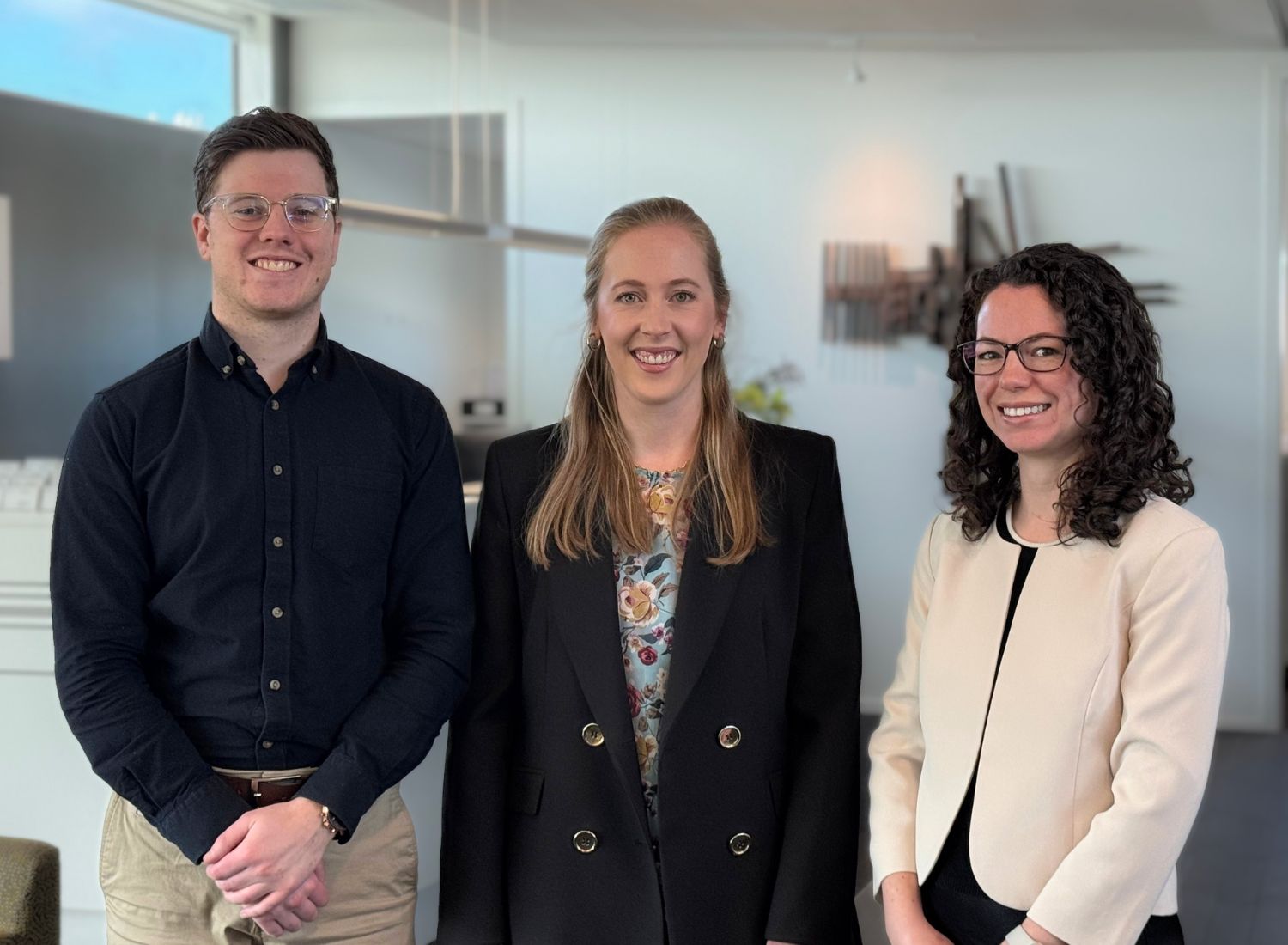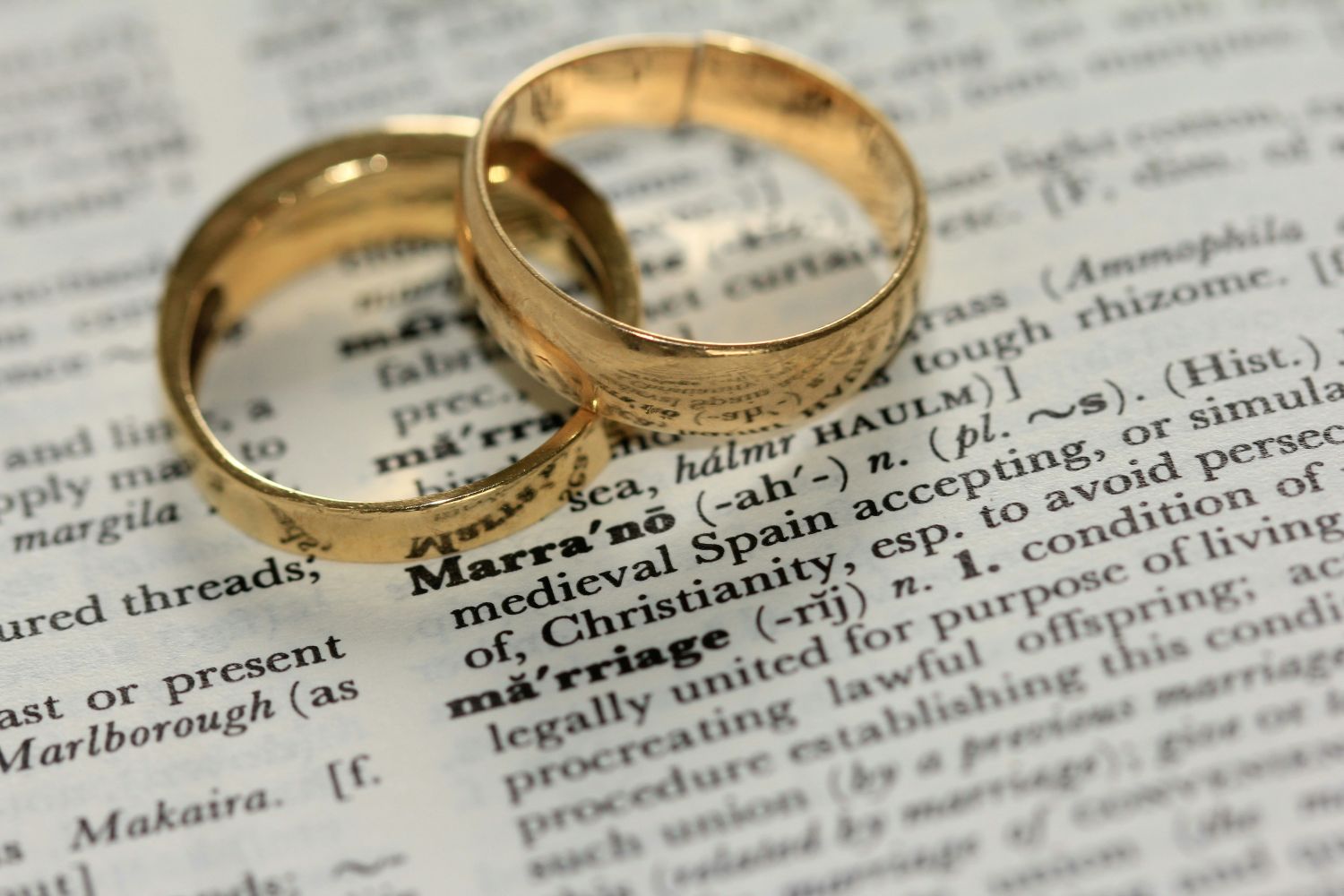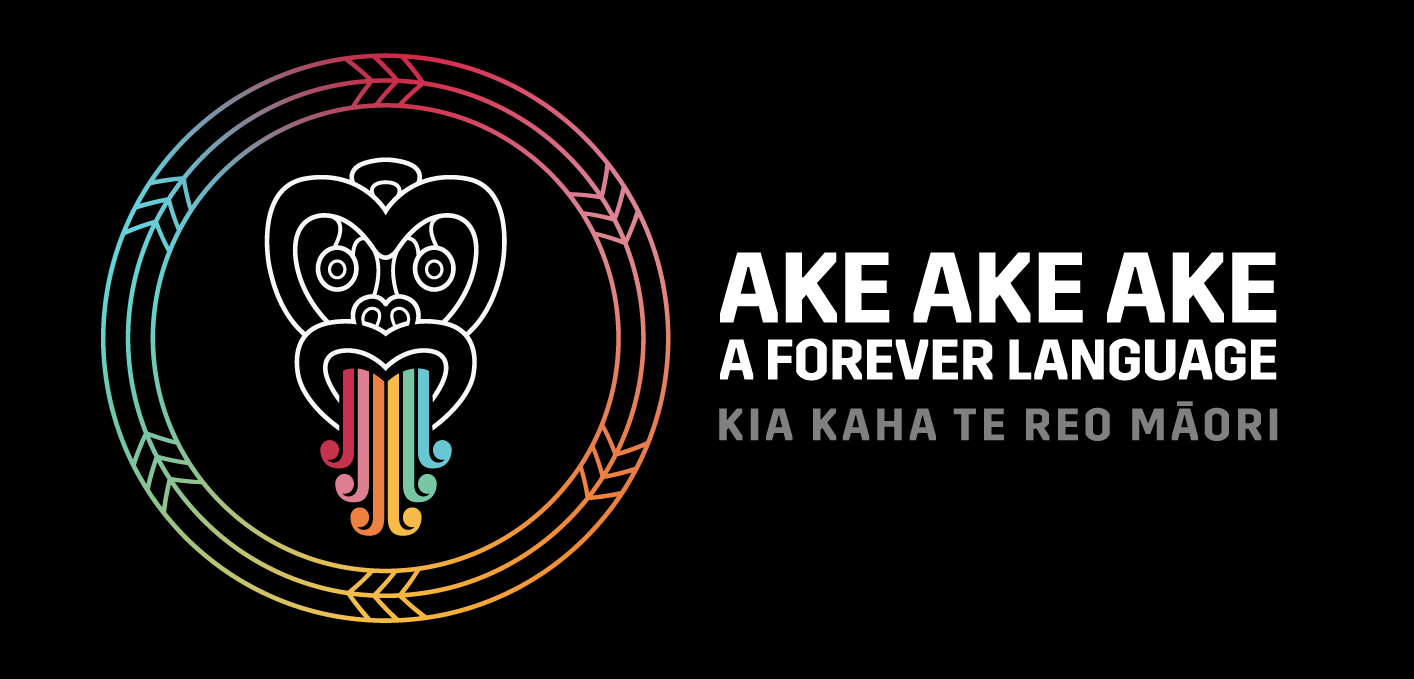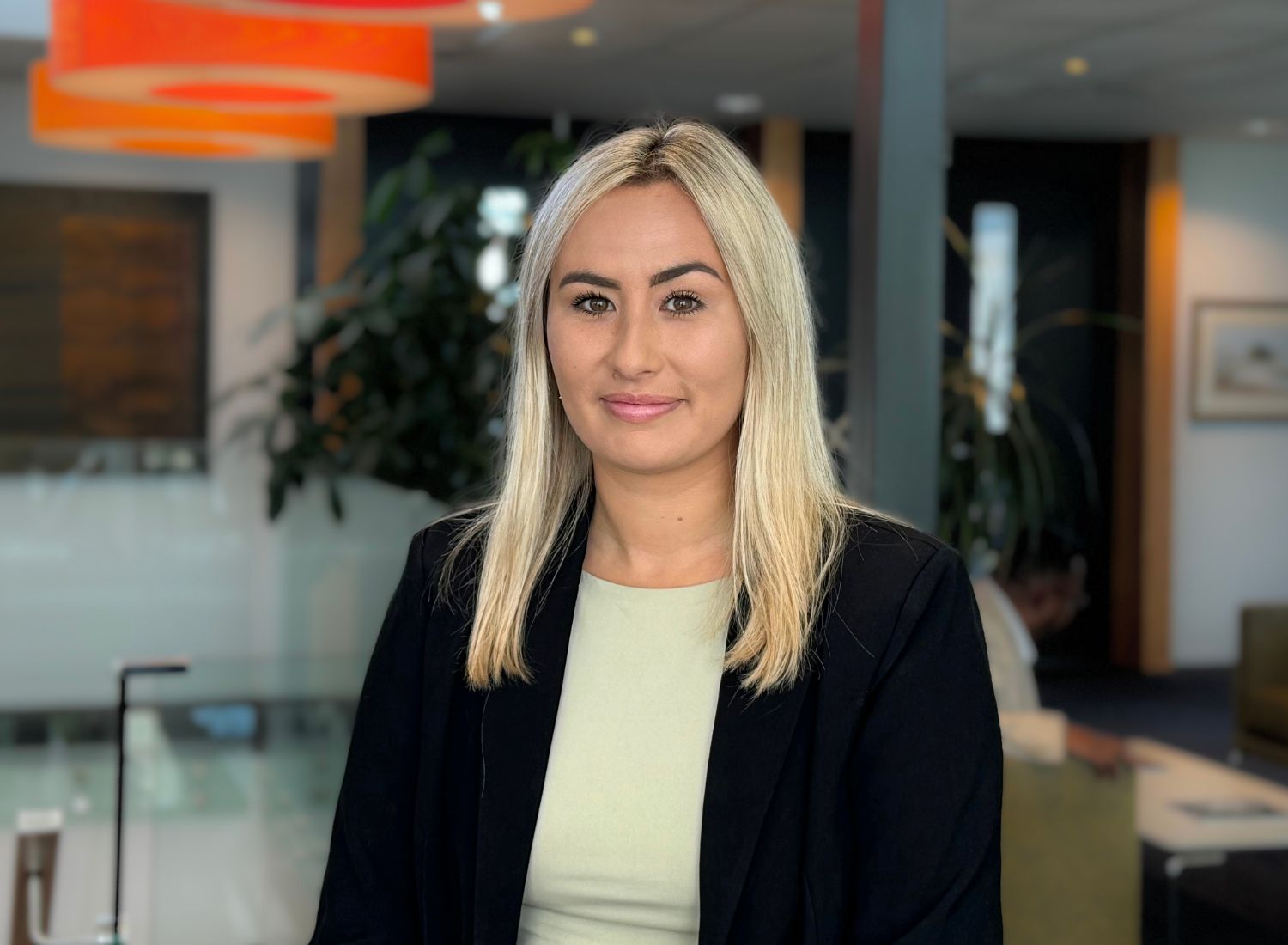Qualifications
- LLB, University of Waikato 2015
- Admitted to the Bar in New Zealand 2017
Contact
- DDI: +64 7 262 0422
- M: +64 27 738 4754
- E: waiata.groot@hobec.co.nz
Waiata is currently on parental leave.
Waiata is a member of our Family Law team, specialising in a broad range of family law matters.
Waiata’s expertise includes:
- Separation and division of relationship property – advising on division of assets (including complex Family Trust and Company structure), negotiating settlements, and preparing Separation Agreements
- Asset protection – including advising on and preparing Contracting Out Agreements (a.k.a. “Prenups”)
- Childcare, Parenting and Guardianship issues – providing legal advice, negotiating agreements, and preparing Family Court proceedings if necessary
- Family Violence – advising on family violence issues, assisting with protection orders and appearing in the Family Court
- Estates and Wills – including legal advice relating to challenging Wills or Family Protection Act claims
- Protection of Personal and Property Rights Act – Court applications regarding personal and/or property orders
- Dissolution of marriage (divorce law)
Waiata achieves practical and desired outcomes for her clients by understanding their needs and resolving issues with sensitivity and legal expertise. Recognising that family matters can often involve high-stress or emotional situations, Waiata is committed to supporting clients through the legal process to find the best solutions for them and their families.
Waiata Groot's Expertise
Waiata Groot's News & Resources

Congratulations to our new Associates
We are delighted to announce the promotion of four lawyers to Associate in our Tauranga team.
These promotions reflect the expertise, dedication and performance of these lawyers, and we look forward to seeing their continued impact and leadership in the years ahead.
Angus Hendry – Property and Commercial
Angus has a wide range of experience in property and commercial transactions, as well as trusts, charities, incorporated societies and estate planning.
Angus is a trustee of the Bay of Plenty Youth Development Trust and drum corporal in the City of Tauranga Pipe Band.
Angus joined Holland Beckett in 2022, after starting his legal career in Palmerston North.
Emily Merrill – Property and Commercial
Emily has experience in a wide range of property and commercial matters including subdivisions, townhouse developments, sale and purchase of residential, commercial and rural properties, refinancing arrangements and commercial leasing.
Emily also has specialist expertise in buying and selling of kiwifruit orchards and forestry assets as well as renewable energy, advising both landowners and developers on large scale solar projects throughout New Zealand.
Emily began her legal career at Holland Beckett as a summer clerk in 2016, before joining the firm proper in 2018 upon completion of her studies.
Rebecca Irvine – Property and Commercial
Rebecca is a highly regarded property and commercial lawyer. She advises on a broad range of matters, including developments and subdivisions, sale and purchase of residential and commercial property, sale and purchase of businesses, commercial contracts and leasing.
Rebecca is particularly experienced in local government transactions and assists local and regional authorities with leasing, Public Works Act matters, commercial contracts, delegations, privacy and general property and commercial advice.
Rebecca has a strong affinity for community-focused work, regularly advising charitable trusts and incorporated societies. She also contributes her time as a committee member of Bay of Plenty Symphonia Incorporated.
Rebecca began her legal career in litigation at a top-tier Wellington firm, equipping her with a sharp analytical edge. She joined Holland Beckett in 2018, later gaining valuable in-house experience at Tauranga City Council before returning to Holland Beckett in January this year.
Waiata Groot - Family
Waiata is in Holland Beckett’s family law team, the largest family law team in the Bay of Plenty. She specialises across a broad range of family law matters including: separation and division of relationship property (including complex Family Trust and Company structures); asset protection and Contracting Out Agreements; parenting and guardianship disputes; family violence (including urgent and non-urgent applications for protection orders): Family Court proceedings; estate claims under the Family Protection Act; applications for personal welfare and/or property orders relating to loss of capacity; and dissolution of marriage.
Waiata is committed to supporting clients through the legal process (often involving high-stress or sensitive family dynamics) to find the best solutions for clients, children and their wider families.
Waiata began her legal career at Simpson Grierson in Auckland in 2016. She then moved to Tauranga where she joined Cooney Lees Morgan for 3 years, before joining Holland Beckett in early 2024.
We are proud to be a firm that is committed to nurturing talent and providing opportunties for professional growth, ensuring that our team enjoy fullfilling legal careers from our beautiful Bay of Plenty offices.

What to do if we can’t agree on the holidays?
Parenting after separation can be hard. What do you do if you cannot agree on care arrangements for the holidays?
What do I do if we cannot agree?
There are several options available to parents who cannot agree on care arrangements.
Parenting Through Separation Course
This is a free course provided by the Ministry of Justice to help people parent well through separation. It will run over key areas of conflict, run through scenarios and provide you with practical advice to deal with disagreements. The parenting through separation course is often a pre-requisite of applying to the court.
Family Dispute Resolution
The first option is a Family Dispute Resolution (sometimes referred to as FDR conferences). A Family Dispute Resolution is a specialist form of mediation. The mediator is not a Judge, but will attempt to assist you both to come to an agreement. You are not forced to come to an agreement but the mediator is a professional who will give you both the time to share your perspectives, concerns and desired outcomes. Family Dispute Resolution is also a common pre-requisite of applying to the court.
Applying to the Court for a Parenting Order
If you have been unsuccessful at coming to an agreement with a parenting through separation course and Family Dispute Resolution, you can apply to the court for a parenting order.
A parenting order will set out the care arrangements for the children in a legally binding agreement. You will both have the opportunity to file documents requesting your preferred care arrangements and a lawyer is appointed to represent your children. The Judge will ultimately make a decision at a final court hearing. This is not a quick process though and it is important to understand this. The advantage is that the Judge’s decision will be binding and any variations will have to be consented to by the other parent.
What if I already have a parenting order?
If you already have a parenting order you can apply to the Court to have those orders changed.
However, this process can take a long time, so it is necessary to begin proceedings a significant amount of time before the holiday in question.
If a parenting order is already in place, it is an offence to break the terms of the order. This means that even if where the kids are during the holidays is not specified in the order, you cannot change the normal arrangement without the other parent’s consent.
What can I do if the other parent breaches the parenting order?
It is an offence for either of you to breach the terms of the parenting order. If the other parent refuses to give you the agreed care, you can qpply to the court for a warrant to enforce the terms of the parenting order. This will give the Police or your social worker the authority to take the children and return them to your care when the other parent is breaching the terms of the parenting order.
If you would like to discuss next steps with a lawyer, our specialist Family Law team is here to help. We have the experience and the know how to help you through your separation and care of children needs.

Just Fund – flexible lending for Relationship Property matters
Australian divorce and separation lender JustFund has launched in New Zealand and Holland Beckett is one of a handful of early adopters to partner with the provider.
When navigating a separation or relationship property matter, the financial strain can sometimes stand in the way of getting the legal support you need. JustFund aims to remove that barrier by providing a flexible, accessible way to cover legal fees for relationship property matters — New Zealand’s only dedicated provider of flexible funding solutions for family law legal fees.
This kind of flexible funding can be life-changing—particularly for those who are financially dependent on a partner, experiencing family violence, or trying to navigate a complex separation without the immediate financial means to proceed. By introducing legal finance early in the process, we want to help ensure that no one is denied quality legal representation simply because of their financial position.
Through our partnership with JustFund, eligible clients can access a flexible line of credit to cover legal fees and expenses related to separation or relationship property proceedings. Unlike traditional lenders, JustFund does not look at income or credit scores to approve funding support for family law matters. The loan is repaid only when the relationship property matter reaches a settlement, giving clients across the socioecomonic spectrum a dignified way to access legal support and the means to pursue a fair settlement without upfront financial pressure.
You can read more about JustFund on the New Zealand Herald here: Australian lender JustFund expands to NZ, aiding divorce legal costs - NZ Herald
Please contact our family law team for more information or visit JustFund.co.nz.

Learning and celebrating Te Reo Māori
This week we are celebrating Te Wiki o Te Reo Māori - Māori Language Week.
The learning and use of Te Reo is something that Holland Beckett supports and encourages, recognising the importance of diversity, inclusion and Māori customs to our firm, the business and legal space, and the wider community.
Over the last few months, our people have had the option to join weekly in-house Te Reo classes. The firm has run these classes previously, to very positive engagement and feedback from staff, and the second series run by kaiako (teacher) Atirau has been a great learning opportunity for our team.
“The classes provide a basic grasp of Te Reo (including pronunciations and a ko wai au/pepeha), Tikanga practices, local myths and legends”, Cory Lipinski explains. This was the first time beyond school that he has taken a Te Reo course, and he has enjoyed the challenge of learning something new that is important to him. “As someone who lacked a proper understanding of Te Ao Māori, I wanted to have a grasp on the language, customs and traditions and their importance to Aotearoa. I believe that everyone in Aotearoa should have a grasp of Te Reo, whether this be speaking and reading the language or a basic understanding of the pronunciation of words. Given that there is a general stance from Government to disincentivise the use of Te Reo and a push back from our own profession to introducing tikanga Māori into the law courses, I think use of Te Reo in everyday activities needs to become the usual practice.”
Cory is a Solicitor in our environment and planning team - “a large part of our work in environmental and planning law is associated with the effects that projects may have on mana whenua. It is important that we have a firm grasp of the Māori language and Tikanga.”
Senior Solicitor Waiata Groot also joined the classes. She is deepening her knowledge of the language “because many of the ongoing challenges Māori face in society today are better understood if we, as individuals and a collective, expand our knowledge on Te Ao Māori (the Māori world view – including the Māori language, the customs and traditions, embracing Māori stories, and understanding their importance)”. This is important to her as Māori she has “seen firsthand the value in both Māori and non-Māori having mutual respect for different ways of doing things and working collaboratively to achieve for results everyone (which, simply put, can only be done if we understand and appreciate cultural differences).”
As a family lawyer, Waiata sees encompassing this knowledge into her work as not only relevant, but essential - “for example, from a care of children perspective, two of the seven principles that NZ Courts must consider when making decisions regarding children include consideration of a child’s relationship with both parents, and that a child’s relationship with his or her family group, whānau, hapū, or iwi should be preserved and strengthened, and, consideration of a child’s identity which includes the child\'s culture.”
Also in our Family Law team, Hannah Robins wasn’t born in Aotearoa and joined the classes as she feels it is “important to have understanding of the values and Tikanga especially while working in the family court”, to better grasp pronunciation and “to learn my mihi enough to confidently speak it in public”. Along with everyone in the class, Hannah praised Atirau as an great teacher, “he has incorporated games and activities into the learning which has made it fun. He is also very good at giving feedback and I don’t think anyone has felt embarrassed or judged if they haven’t known something”.
This Te Wiki o Te Reo Māori we\'re encouraging the whole firm to get involved with Te Reo Māori phrases and cue cards in and around the office, competitions for the use of Te Reo, and Te Reo Māori Bingo along with a Hangi lunch.
Mā te kimi ka kite, Mā te kite ka mōhio, Mā te mōhio ka mārama.
Seek and discover. Discover and know. Know and become enlightened.

Relationship Property – if we split, who gets the family dog?
Separation can be a difficult process. Not only are there a lot of emotions involved, but there are likely to be assets that are owned jointly, or separately but which have been used by both parties during the relationship. Working out who gets to keep what can be straight forward in some cases, but often the matter is more complex than you may expect.
The Property (Relationships) Act 1976 (“PRA”) applies to marriages, civil unions or de facto relationships of three years or more. In limited circumstances, the PRA can also apply to relationships of shorter duration.
What is relationship property?
The PRA defines both relationship property and separate property.
The family home and family chattels, whenever acquired and in whoever’s name they are legally owned, are relationship property. Contrary to popular belief, whether or not you owned the family home or chattels before the relationship, they will be relationship property dividable equally between both parties to the relationship (subject to certain limited exceptions). Family chattels can include furniture, appliances, household tools, pets, as well as cars, caravans, trailers and boats if they were used wholly or principally for family purposes. Gifts from one spouse or partner to the other are generally not regarded as relationship property – so no, you don’t have to give back the rings.
Relationship property may also include superannuation and KiwiSaver, shares and investments, business interests, life insurance policies, rental and investment properties, property acquired in contemplation of the relationship, rights in respect of a trust, as well as relationship debt (which does not have to be in the parties’ joint names). Bank accounts which hold funds earned or received during the relationship are also likely relationship property despite being in the name of only one of the parties.
Taonga and heirlooms, as well as chattels used wholly or principally for business purposes, are excluded from the definition of family chattels. This means these items will usually be separate property rather than relationship property, however this is decided on a case-by-case basis.
What is separate property?
Any property that is not relationship property is separate property. Such property does not need to be divided between the parties to the relationship.
Generally, separate property also includes:
Property which was acquired by either party whilst they were not in a relationship and that has not been used during the relationship for family purposes;
Property acquired out of separate property or any proceeds of sale of separate property;
Any increase in value of separate property and any increase in income or gains derived from separate property;
Property acquired from a third person by gift, inheritance, or as a beneficiary of a third person’s trust.
It is important to keep property acquired by succession, survivorship, gift, or under a third party’s trust separate if you intend it to be separate property. If property can be seen to have been intermingled with relationship property, making it unreasonable or impracticable to regard it as separate property, it will become part of the relationship property pool.
How is relationship property divided?
While relationship property is generally divided equally between the parties of the relationship, there are limited circumstances where division should occur in unequal proportions. This may be due to economic disparity between the parties because of the effects of the division of functions within the relationship or in extraordinary circumstances that would make equal sharing repugnant to justice – although this is a high threshold to meet.
Disclosure
In order for your lawyer to advise you on what the full relationship property pool consists of and what your legal entitlements are, a process of disclosure by both parties of all assets, debts and interests must take place. Values will be determined, as well as the status of the item as relationship property or separate property. Following the completion of that process, the division of property can usually then be agreed by way of negotiation.
Will we need to go to Court?
Most people do not need to resort to the Family Court in order to resolve their relationship property division. It is only if an agreement cannot be reached between you and your former spouse/partner that Court proceedings are needed.
Who gets what?
You won’t walk away with half of a car so don’t get the chainsaw out. Generally, global division of relationship property can be reached without property needing to be sold – or cut in half. This involves taking into account the total value of the assets being retained by each party, and one global adjustment figure being paid by one party to the other party to ‘equalise’ the overall division so that each party is keeping 50% of the total net value of the relationship property pool.
What about the pets?
With the classification of pets such as cats and dogs as family chattels, you obviously will not both be able to keep your fur babies. The court has formulated their own way of determining who gets to keep the pet based on the pet’s best interests. This means the court considers things like who takes the best care of the pet, who is able to provide the best home for the pet and the pet’s needs.
Independent legal advice
Each party must receive independent legal advice as part of entering into a legally binding Separation Agreement. To be valid as a full, final and binding settlement, any agreement must be in writing and signed by both parties after independent legal advice and in the presence of their lawyers.
If you find yourself experiencing a break up of a long term relationship, the specialist Family Law team at Holland Beckett can offer you practical and pragmatic advice with care and sensitivity. We have a team of lawyers who are experienced in negotiating and drafting Separation Agreements, or taking matters to court if needed.

Rainey v Kwok – why maintenance needs an overhaul
This article was published in the New Zealand Law Journal, where our family team comments on a recent Court of Appeal case where ongoing maintenance was awarded to a de facto partner for an extended period of time, and explains why the current maintenance system needs an overhaul.
In March 2020, the High Court heard the matter of Kwok v Rainey [2020] NZHC 923. It was a substantive hearing on the near full gamut of relationship property claims possible under New Zealand’s relationship property regime, with some highly interesting findings (particularly in relation to costs as damages, at [244] to [264]). However it had one concerning outcome: it found that Mr Rainey was liable for maintenance to Ms Kwok of over half his yearly income for a period of 3.5 years, which was almost half the length of the relationship itself. On appeal (Rainey ato David Rainey Family Trust v Kwok [2021] NZCA 199), this ruling was overturned, and Mr Rainey was ordered to pay the High Court level of maintenance for a period of two years, and a vastly reduced maintenance sum for a further nine months. This article posits the Kwok v Rainey is a clear example of why the current regime can produce unjust outcomes, why reform is needed and why Family Income Sharing Arrangements (FISAs) may provide the answer. This case illustrates both the inadequacies of the current law and the injustice that can occur when it is improperly applied.
Facts
Wan Lan Kwok, a Hong Kong resident, met David Rainey, a builder from Tauranga, when she was in New Zealand in August 2008. There was evidence that Ms Kwok was working (albeit without a visa). Both were in their mid-forties and had come from previous long-term relationships with two adult children each. They quickly developed a relationship. By 1 March 2009, Ms Kwok was living and working with Mr Rainey in New Zealand. When granted a resident’s visa on the basis of her partnership with Mr Rainey in August 2011, Ms Kwok relocated to New Zealand.
During the relationship Ms Kwok assisted Mr Rainey on building sites with basic labour from time to time and was paid a wage by his company. Mr Rainey was also employed by his company as a builder.
Mr Rainey, having seen his assets halved on two occasions as a result of relationship property proceedings, was committed to the relationship but wanted to protect his own assets. After the couple had lived together for approximately two and a half years, Mr Rainey sought advice from the law firm Gascoigne Wicks (GW) as to how to do so. By this stage Mr Rainey had purchased a section in Tauranga where he intended to build a house. Based on GW’s advice, Mr Rainey set up a trust which was to own the section. Mr Rainey then built a house on the section and they lived there as a couple until the relationship came to an end in September 2016.
Both parties were of modest means. Ms Kwok was 55 at the time of the hearing and had lived in New Zealand on and off for 12 years. Mr Rainey was 54, and unable to work full time as a builder after battling cancer. Mr Rainey has had two previous marriages, and had two adult children with his first wife. Mr Rainey and Ms Kwok had no children together. In October 2018, Ms Kwok had received an interim maintenance order by the Family Court of $200 per week for six months. In March 2020 at the High Court hearing, Ms Kwok sought a half share in the house (held in trust), the current account of Mr Rainey’s building company, $785 of maintenance per week and a half share of the family chattels.
Overview of present law
Post-separation maintenance is governed by the Family Proceedings Act 1980 (FPA). The overarching statutory policy is that neither party to a de facto relationship is liable to maintain the other after ceasing to live together (s64), A ‘clean break’ principle is imposed, which encourages former partners to become self-sufficient. There are statutory exceptions to this general policy.
The relevant sections for determining a de facto maintenance application are ss 64, 64A, 65, 66, 69 and 70. Principally, s 64 deals with maintenance in a de facto relationship (as was the case in Rainey v Kwok). This section provides that each partner is liable to maintain the other only to the extent necessary and where the other partner cannot practicably meet their own reasonable needs because of specified circumstances (s64; s64A). Sections 69 and 70 provide the Court with a broad discretion as to how payment will be made and how it is to be calculated. However, these wide powers are then tempered by ss 64 and 64A, which set out the only circumstances in which one party will be liable to maintain the other after the relationship ends. Section 65 then prescribes matters that the Court must have regard to in determining the amount payable, and certain kinds of conduct and misconduct may also be taken into account (s 66).
Ultimately, the Court can consider any relevant circumstance in determining if the maintenance threshold is met (s64; s64A), and must consider factors relating to both payer and payee’s means and financial responsibilities when determining quantum (s65). It cannot be a punishment for the breakdown of the relationship (G v C FAM-2007-004-2155/2156, 8 October 2008 as cited in C v G [2010] NZCA 128 at [17]).
Having a broad discretion certainly provides the tools for a fact specific result, accepting that there is no one size fits all in maintenance, However, in the writers opinion, the present system also can produce unjust results.
Interestingly, case law on interim maintenance has developed a justice inquiry (Ropiha v Ropiha [1979] 2 NZLR 245 at 247; Cooper v Pinney [2016] NZHC 1633 at [20]), but this ‘sanity check’ has not developed in the final maintenance inquiry.
The High Court judgment
Thomas J ordered that Mr Rainey pay $785 per week for (in effect) 3 and a half years. That was almost half the length of the entire relationship, and in circumstances of both parties being of modest means, both in their forties when they met, no children together and Ms Kwok taking no steps to obtain employment in the four years between separation and the hearing.
Her Honour, citing Slater v Slater [1983] NZLR 166 (CA) at 174, held that parties cannot be expected to be self-supporting until they have received their share in relationship property.
The appeal
The High Court decision was overturned in part. The Court of Appeal (Cooper, Gilbert and Goddard JJ) held that a reasonable period for Ms Kwok to become self-supporting would be two years, had she had her relationship property. Because Ms Kwok did not have her share for four years (due to the High Court litigation), a period of two years at $785 per week and nine months at $200 per week was ordered.
The Court also held that her Honour was wrong to impose the inflexible principle of requiring relationship property before partners can be expected to support themselves.
Worryingly, the Court of Appeal did not think it was necessary to determine Mr Rainey’s actual income because he could earn a “reasonably good income” as a builder. When dealing with parties of modest means (not the Mr Clayton’s of the world: see Clayton v Clayton (Vaughan Road Property Trust) [2016] 1 NZLR 551, [2016] NZFLR 230, [2016] NZSC 29)) actual affordability should certainly be a relevant circumstance to take into account (s65). That aside, the maximum actual income for Mr Rainey referred to in the decision was approximately $80,000 per annum. Payment of $785 per week equates to approximately $40,000 per annum. The Court therefore considered it reasonable for Mr Rainey to pay in effect 50% of his income to Ms Kwok whilst paying all outgoings and expenses for the family home (including the mortgage). Ms Kwok also benefitted from the delay caused by litigation by the increase in value of the family home.
Issue: unfair and uncertain
Despite the broad discretion, in practicality, the Court’s inquiry is very applicant/payee focused. Certainly, where a more traditional relationship exists, the current maintenance provisions do the job. However, it is the writer’s view that where the ‘payer’ is not a high-income earner, the outcome can cause real financial harm. The Court’s inquiry does not seem to place enough weight on the functions of the relationship and actual affordability for the respondent. Under the FPA, it must still be reasonable for the respondent to pay maintenance and for it and be causally connected to the relationship. It can lead to unpredictable outcomes. In Rainey, Ms Kwok claimed that her age and inability to speak English prevented her from being able to gain employment. Yet those factors existed when she first came to New Zealand before meeting Mr Rainey, and she had taken no steps to improve her circumstances post-separation.
Proposed Reform
In 2017, the Law Commission undertook a review of the relationship property regime in New Zealand and sought to modernise it in line with New Zealand’s changing society. Ultimately, the Law Commission recommended that s 15 of the Property (Relationships) Act 1076 (PRA), ss 63, 64, and 82 of the FPA be repealed and replaced with a FISA regime. A partner would only be entitled to a FISA if their relationship was 10 years or longer (unless the parties had children together) or the applicant’s contributions to the relationship either advanced the respondent’s career or was at the sacrifice of the applicant’s career. Subject to orders for adjustment where serious injustice is caused, there would be a cap on the time period for which maintenance could be paid (for up to five years) and a statutory formula for calculation of payments. The formula is based on the family income received during the relationship (as opposed to future earning capacity).
A key focus for FISA is ensuring that partners are only entitled to FISA if their financial need is connected to the relationship. The Commission commented that if it was not, it should be the State’s responsibility to financially support that person.
In 2019, the Government responded to the FISA proposal, accepting that the current PRA framework is no longer fit for purpose. It declined to give effect to the recommendations at the time but will consider them concurrently with the Law Commissions review of succession law. The Law Commission is currently reviewing submissions on succession.
The Court of Appeal in Rainey v Kwok made no specific comment on the social policy of maintenance, the need for justice in maintenance orders or the Law Commission’s PRA recommendations. This despite hearing submissions on the points as comparison tools for the Court’s maintenance assessment.
Will FISA work?
In effect, FISA will work like the Inland Revenue’s child support scheme via a default implementation system. Like the child support scheme, FISA is recommended to have set calculation formulas that can apply immediately on separation but be adjusted by the Court if necessary to prevent injustice. In the writers opinion, the FISA system is a step in the right direction to anchor the core principle of a causal connection between a party’s needs and the obligation to support . The certainty provided by predicable eligibility characteristics (length, children, contributions – albeit with some flexibility as is necessary) is a key benefit. The predictability of the scheme also paths the way for parties to resolve their own maintenance issues without necessarily needing to use the clogged justice system or incur legal fees.
The most beneficial aspect is the heightened eligibility threshold. Anecdotally, the writer knows many relationships that easily meet the de facto threshold (s2D of the PRA) but are not of such a level of seriousness where the parties commit to financially supporting one another on separation, particularly for relationships in the younger adult generation.
Had the FISA scheme been in place, Mr Rainey may have avoided liability to maintain Ms Kwok. This would have been a fair result given that this was a late-in-life relationship for parties with no children together and modest means.
Next steps
The legal profession now eagerly awaits for the Law Commission finishing its review on succession law. With the Government’s acknowledgement that the system needs to change, it is hoped that a new system can be predictable, user friendly and, above all, only applicable in circumstances where the seriousness of the relationship justifies ongoing support.
This article was published in the December 2021 edition of the New Zealand Law Journal




